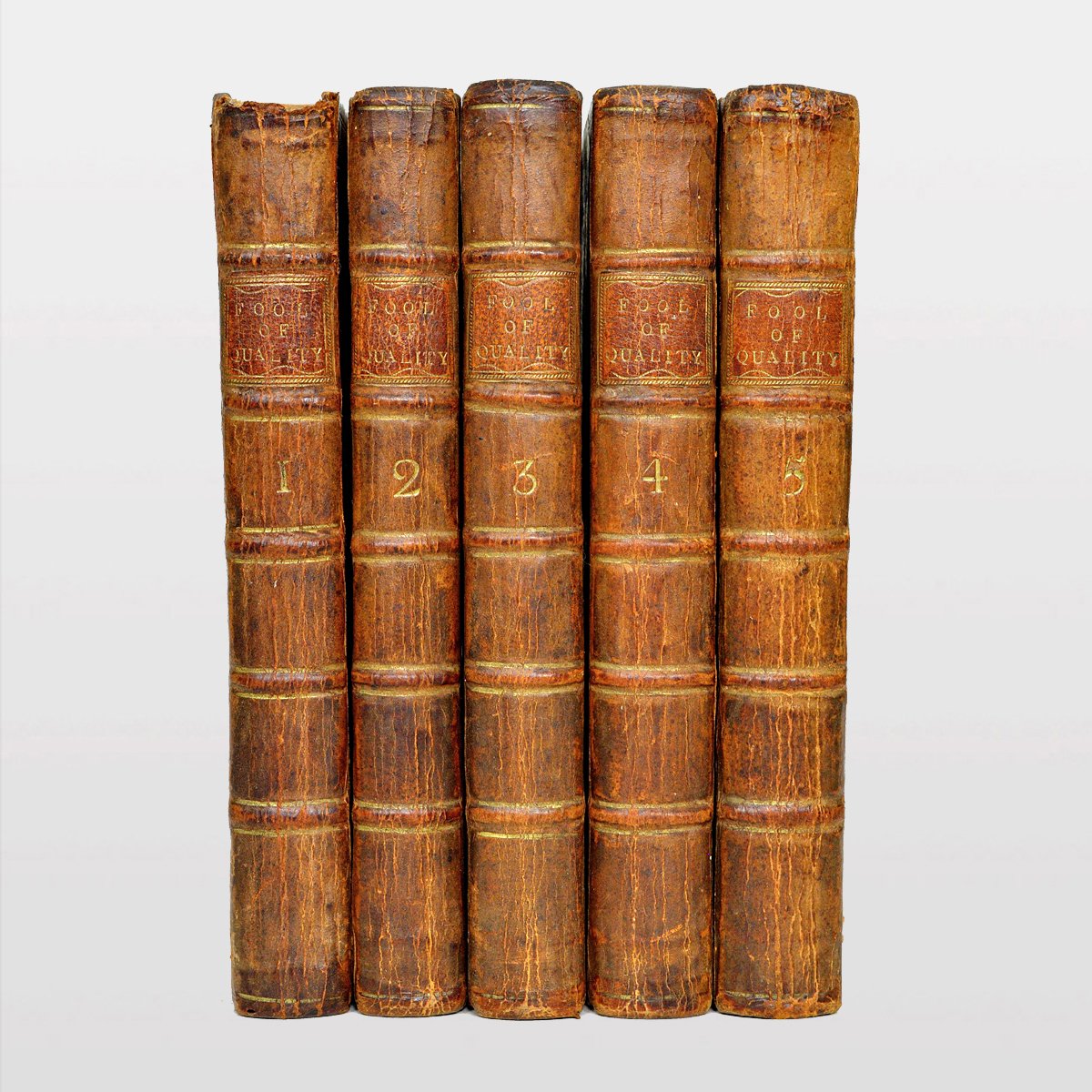 Image 1 of 1
Image 1 of 1


The Fool of Quality. BROOKE (Henry).
The Fool of Quality; or, the History of Henry Earl of Moreland. In Four Volumes.
Second Edition of vols.1 and 2, First Edition of vols. 3-5. 12mo. [175 x 103 x 113 mm]. 300pp; 298pp; 296pp; 306, [2] pp; 300pp. Five volumes. Uniformly bound in contemporary calf, the covers with a gilt double fillet border, the spines divided into six panels with raised bands flanked by a gilt fillet, lettered in the second on a red goatskin label and numbered directly in the third, plain endleaves, lightly sprinkled edges. (Upper headcap on vol.1 broken, rubbed, with a few small patches of insect activity).
London: printed for W. Johnston, in Ludgate Street, 1767-1770
With the Advertisement leaf at the end of vol.IV explaining that there would be a fifth volume. A few spots and signs of having been read but a very good copy. With early pencil shelf-marks "3.26.23[-27]".
"Brooke's main literary fame came to rest on a novel which he started late in life, The Fool of Quality (5 vols, 1766-1770). Like Goldsmith's The Vicar of Wakefield (1766) or Henry Mackenzie's The Man of Feeling (1771), the novel exemplifies a genre which flourished at the time, linked both to Rousseau's Nouvelle Heloise and to Goethe's Werther, but also firmly rooted in the British traditions of Francis Hutchinson's benevolent moral philosophy, the patriotic cult of virtue, and the popular genre of the sentimental comedy. [...] Brooke's novel maintained some posthumous fame as a sentimental variation of the Pilgrim's Progress, John Wesley edited a shortened version under the title Henry, Earl of Moreland (1781), long a classic among Methodists; a full re-edition of The Fool of Quality was brought out in 1859 by Charles Kingsley. [...] While The Fool of Quality is now seen at best as a curious example of English sentimentalism, Henry Brooke's continuing interest nowadays is mainly based on his manifold connections with the moral and political life of his times. A representative of the tightly-knit Anglo-Irish class of the mid-eighteenth century and a man of letters trying his hand at various literary genres, he had a sentimentalism which could lead to a positive appreciation of Gaelic folk life and antiquity and to a libertarian defence of patriot principles, while remaining true to a staunchly protestant outlook never wholly free from anti-Catholic reservations. The result of this may seem hybrid and contradictory nowadays, but is probably exemplary of whiggish protestant opinion in a period of tension and transition" - ODNB.
Stock no. ebc8279
The Fool of Quality; or, the History of Henry Earl of Moreland. In Four Volumes.
Second Edition of vols.1 and 2, First Edition of vols. 3-5. 12mo. [175 x 103 x 113 mm]. 300pp; 298pp; 296pp; 306, [2] pp; 300pp. Five volumes. Uniformly bound in contemporary calf, the covers with a gilt double fillet border, the spines divided into six panels with raised bands flanked by a gilt fillet, lettered in the second on a red goatskin label and numbered directly in the third, plain endleaves, lightly sprinkled edges. (Upper headcap on vol.1 broken, rubbed, with a few small patches of insect activity).
London: printed for W. Johnston, in Ludgate Street, 1767-1770
With the Advertisement leaf at the end of vol.IV explaining that there would be a fifth volume. A few spots and signs of having been read but a very good copy. With early pencil shelf-marks "3.26.23[-27]".
"Brooke's main literary fame came to rest on a novel which he started late in life, The Fool of Quality (5 vols, 1766-1770). Like Goldsmith's The Vicar of Wakefield (1766) or Henry Mackenzie's The Man of Feeling (1771), the novel exemplifies a genre which flourished at the time, linked both to Rousseau's Nouvelle Heloise and to Goethe's Werther, but also firmly rooted in the British traditions of Francis Hutchinson's benevolent moral philosophy, the patriotic cult of virtue, and the popular genre of the sentimental comedy. [...] Brooke's novel maintained some posthumous fame as a sentimental variation of the Pilgrim's Progress, John Wesley edited a shortened version under the title Henry, Earl of Moreland (1781), long a classic among Methodists; a full re-edition of The Fool of Quality was brought out in 1859 by Charles Kingsley. [...] While The Fool of Quality is now seen at best as a curious example of English sentimentalism, Henry Brooke's continuing interest nowadays is mainly based on his manifold connections with the moral and political life of his times. A representative of the tightly-knit Anglo-Irish class of the mid-eighteenth century and a man of letters trying his hand at various literary genres, he had a sentimentalism which could lead to a positive appreciation of Gaelic folk life and antiquity and to a libertarian defence of patriot principles, while remaining true to a staunchly protestant outlook never wholly free from anti-Catholic reservations. The result of this may seem hybrid and contradictory nowadays, but is probably exemplary of whiggish protestant opinion in a period of tension and transition" - ODNB.
Stock no. ebc8279
